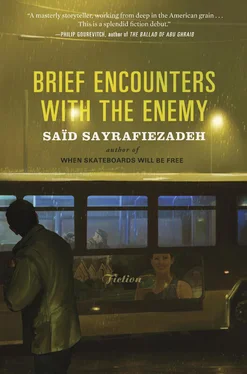Said Sayrafiezadeh
Brief Encounters with the Enemy
For Karen Mainenti and Steven Kuchuck
The winter the bus drivers went on strike I was twenty-three years old and living on the edge of the city in a neighborhood that was on the verge of becoming a ghetto. The parks had closed, and so had the supermarket, and also the elementary school, and every night the streetlights appeared to have gotten dimmer. The easiest way into and out of the neighborhood was by crossing through an underpass, but everyone had stopped using that. Instead, we took the long way up the hill and over the thoroughfare that ran six lanes. It was no longer a surprise to pick up the morning newspaper and learn that there had been yet another regrettable occurrence in the neighborhood the previous day. In the middle of the night, I would be jolted out of my dreams sometimes by the sound of police sirens or fire engines or car alarms or once even the voice of a man, just beneath my bedroom window, cooing submissively, “Please take my wallet.”
Earlier that fall, things had taken a turn for the worse when I had been fired from a good job as a cartographer in a design studio that I had worked in for only about four months. The owner of the firm was a tubby, bearded, gregarious, well-read man named Ned Frost, who had large white teeth and a habit of vigorously rubbing his hands together when he laughed, as if he were attempting to start a fire with his palms. He wore tweed jackets, had bad breath, and fancied himself a poet. “I am the state’s leading poet,” he had announced once to everyone in the office — this despite having never been published. When I had first met him, he seemed pleasant, unassuming, charming even, and on my third day of work he had taken me out to a special lunch, and then a few days later out to a special dinner to discuss “the work that lies ahead.” He seemed to find many of the things I said delightful, and a few times he leaned back in his chair and laughed and rubbed his hands together. His interest in me gave me confidence that I was someone who might have a bright future after all. But no more than three weeks after I had started working for him, he informed me that I was a closeted gay man and that if only I had the courage to admit this, then the two of us could be together. During the day, instead of doing work, he would compose long, meandering letters to me that began with “My Dearest Rex” and included phrases such as “and yes, yes, I saw you standing there, yes” or “there is a leaning into warmth, a leaningintoness that only eyes know.” I could hear him typing away in the adjacent office, and I would know that the printer beside my desk would soon begin to hum and out would come five, six, seven single-spaced pages. An hour or so later, he would enter and stand by my desk, hovering, shifting from foot to foot, his hands deep in his pockets jingling coins, pretending to busy himself with files, waiting for me to initiate conversation.
I had learned from a female intern that I was just one in a succession of young men whom Ned Frost had hired, courted, and then, when they rebuffed him, fired. I wanted to keep the job, of course, so I tried my best to pretend things were normal and aboveboard. My only identifiable skill was apparently an ability — recognized by Ned Frost — to design maps, and I envisioned myself as a great failure if I allowed this once-in-a-lifetime opportunity at a vocation to slip away. “You have to walk through the doors when they’ve been opened for you,” my father often counseled. Sometimes I would wonder if I was imagining Ned Frost’s advances, if I was exaggerating the nature of his interest in me. “Perhaps I am overplaying all of this,” I would reason with myself, and it would help me to feel calm and even hopeful. But one afternoon any ambiguity was finally put to rest when, at the end of an immense sixteen-page letter about the movie E.T . — particularly the scene in which the alien presses his throbbing finger against the young boy — Ned Frost signed off, “My cock feels full with the thought of you in my heart.”
It was winter now and it was cold and the bus drivers were on strike. And the war was coming, everybody said so. Because of this confluence of events no one was sympathetic to the drivers’ cause. It was seen as a selfish act of sabotage. Each night the mayor would make an appearance on the news, explaining how this wasn’t the time for individuals to worry about personal gain. “Now is the time to come together,” he’d say. In reality, it was only poor people who needed to ride the bus, so they were essentially the ones who were affected by the strike, scrambling to get to work by any means, sometimes eight to a car. The only poor person I knew who wasn’t affected was my neighbor Frankie, a fifty-year-old man who lived across the hall from me and whose left side had been paralyzed by a stroke several years earlier. It took enormous effort for him to stand or walk, and he went outside on average twice a month, once to the bank and once to the post office. He also had a difficult time speaking, and when the news first broke of the strike, he stood in his doorway grinning at me and stammering, “I could care … I could care … less!” For him the strike had become a great equalizer, handicapping everyone, including me.
In spite of his miserable physical condition, Frankie was easygoing, affable, a man who had come to accept his lot in life. I believed I would have killed myself if I had to scrape down the stairwell like him, doing in five minutes what a two-year-old could do in thirty seconds, but he never complained. He had become adept at managing everything himself, mostly by using his right hand, and he would adamantly turn down any offers of assistance.
“I can help you with that, Frankie,” I’d say, watching him wrestle with a can opener as if it were a live fish.
“Look at me! Look at me!” he’d exclaim proudly, and the can of beans would pop open.
A lifetime of alcoholism had been responsible for his stroke, so he had only himself to blame. This seemed to be an empowering thought for him, and he repeated it often and with great intensity. “Me!” he’d say, and tap his chest. “Me!”
When I had first moved into the apartment and seen Frankie standing in the hallway in a dirty white T-shirt, leaning on his rocker, stubble and no teeth, I was frightened and repulsed. He struck me as a pervert, a degenerate, the kind of man who would have dressed in a trench coat. Then one evening he knocked on my door, handed me a few crumpled dollar bills, and asked if I would do him a big favor and buy him three boxes of M&M’s. “Two … two … peanut. And one plain.” I told him I was busy, sorry, and shut the door. Then I felt guilty, went out into the hallway to find him shuffling off in slow motion, took his money, walked six blocks to the Buy ’n’ Save and bought him what he wanted. After that he began inviting me over to share the Chinese food he would order. “I can’t … I can’t … eat all this shit,” he’d tell me. At first I took cynical advantage of his generosity, sitting on his couch, stuffing my face with chow mein, thinking the entire time that listening to him sputter on for half an hour wasn’t a bad trade-off for a good meal. But after a while I began to enjoy his company, and I would look forward to him inviting me over so I could hear his stories about working as a low-level manager in a VA hospital. “I never did … a damn thing!” he’d say, and his shoulders would shake with laughter. Eventually I ceased to be nauseated by the fact that he ate with his fingers, kept his false teeth in a glass on the table, blew his nose into an old pair of underpants, and pissed into an aluminum cooking pot while standing in the living room because it was too difficult to walk to the bathroom. “Pardon me,” he’d say, and unzip himself. After our meal was over, we would sit around and watch basketball on his cable. Frankie told me that he had been a star basketball player when he was in high school, a story I found hard to believe and which I kept making a point to look up but never did. “They all suck,” he’d say of the players on television.
Читать дальше












